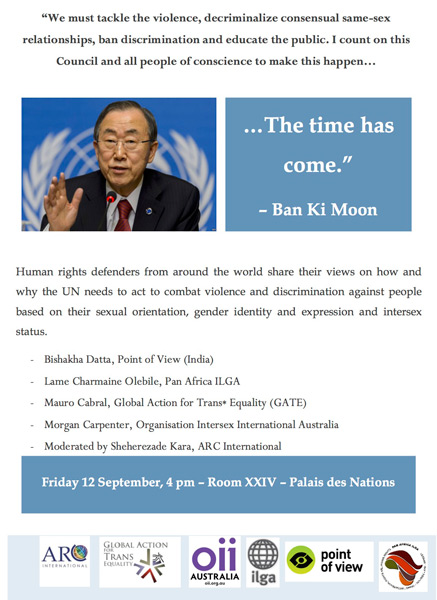UN Human Rights Council: resolution, statement and side event, “The time has come”
Several significant events for intersex people are taking place during this September’s UN Human Rights Council in Geneva.
Resolution on sexual orientation and gender identity
Events include proposals for a SOGI (Sexual Orientation and Gender Identity) resolution aimed at eliminating violence and discrimination that does not expressly include intersex status or intersex issues. However, the elimination of such violence and discrimination, and related improvements in broader social expectations regarding sex and gender roles, benefits intersex people too. We welcome the resolution and hope it will be adopted by the Human Rights Council.
Statement on human rights violations
Morgan Carpenter prepared a two minute statement to bring the attention of the Human Rights Council to human rights abuses affecting people with intersex variations. Unfortunately, timings didn’t work out for Morgan to deliver this personally, however André du Plessis of ILGA kindly delivered this statement on 22 September:
Thank you, Mr President. Intersex people are born with atypical physical sex characteristics, including atypical genetic, hormonal or anatomical features.
We face deep-seated stigma and human rights abuses. We may be subjects of infanticide in Uganda; or sex assignment based on parent attitudes towards dowries in Malaysia. Intersex girls are excluded from policies preventing Female Genital Mutilation. We’re being cleansed from the gene pool in the UK and other countries.
Medically unnecessary interventions take place on children everywhere, without informed consent, explicitly intended to make bodies conform to sex or gender norms. The Special Rapporteur on Torture, and a joint UN agencies statement on forced sterilization have raised concern about surgeries to “fix” children’s sex, without informed consent.
Despite 60 years of medical research, there is no firm evidence of good outcomes.
In April, the British Medical Journal reported on 4 elite women athletes with intersex traits, all from developing countries. The athletes were sterilised in a clearly coercive process, to compete in sport. The International Olympic Committee mandates active investigation of “any perceived deviation in sex characteristics”. The report said:
“The most striking and troubling illustration of these concerns is that all of the athletes in the recent report had “partial clitoridectomy.” Clitoridectomy is not medically indicated, does not relate to real or perceived athletic ‘advantage’… Moreover, this technique … has poor cosmetic outcomes and damages sexual sensation and function. Clitoral surgery should have no role in interventions undertaken for athletes’ eligibility or health.”
Other outcomes from medical treatment include chronic pain and trauma.
Mr President, these human rights abuses desperately need attention. Intersex human rights defenders are ready to talk with you. Thank you.
References:
Rebecca M Jordan-Young, Peter H Sönksen, Katrina Karkazis (April 2014) Sex, health, and athletes in British Medical Journal.
BMJ 2014;348:g2926 doi: 10.1136/bmj.g2926, http://www.bmj.com/content/348/bmj.g292 accessed 16 September 2014.Organisation Intersex International Australia (July 2014) Morgan Carpenter at LGBTI Human Rights in the Commonwealth conference, https://oii.org.au/27467/lgbti-human-rights-in-the-commonwealth/ accessed 16 September 2014.
The text was reviewed by the board of OII Australia, and also by Mauro Cabral and Dan Christian Ghattas. The final text is the responsibility of Morgan Carpenter.

Side event: “The time has come”
Morgan Carpenter took part in a UN Human Rights Council side event tomorrow, alongside Mauro Cabral (GATE/Argentina), Bishakha Datta (Point of View/India), and Lame Charmaine Olebile (Pan Africa ILGA/Botswana). It was moderated by Sheherezade Kara (ARC International).
It came as the UN Human Rights Council prepares to discuss a resolution on sexual orientation and gender identity. We welcome the resolution and hope it will succeed. However, we understand that intersex issues will be not be part of the resolution. Indeed, intersex health and human rights issues are poorly addressed by sexual orientation and gender identity attributes, hence Australia’s adoption of the new attribute of intersex status.
The event took place on Friday 12 September at 4pm local time in Geneva, Swtizerland. The event was recorded and will later be available via Youtube.
Acknowledgements
Our participation in these events is wholly and very kindly supported by GATE and ILGA; it would be impossible without that support.
You must be logged in to post a comment.